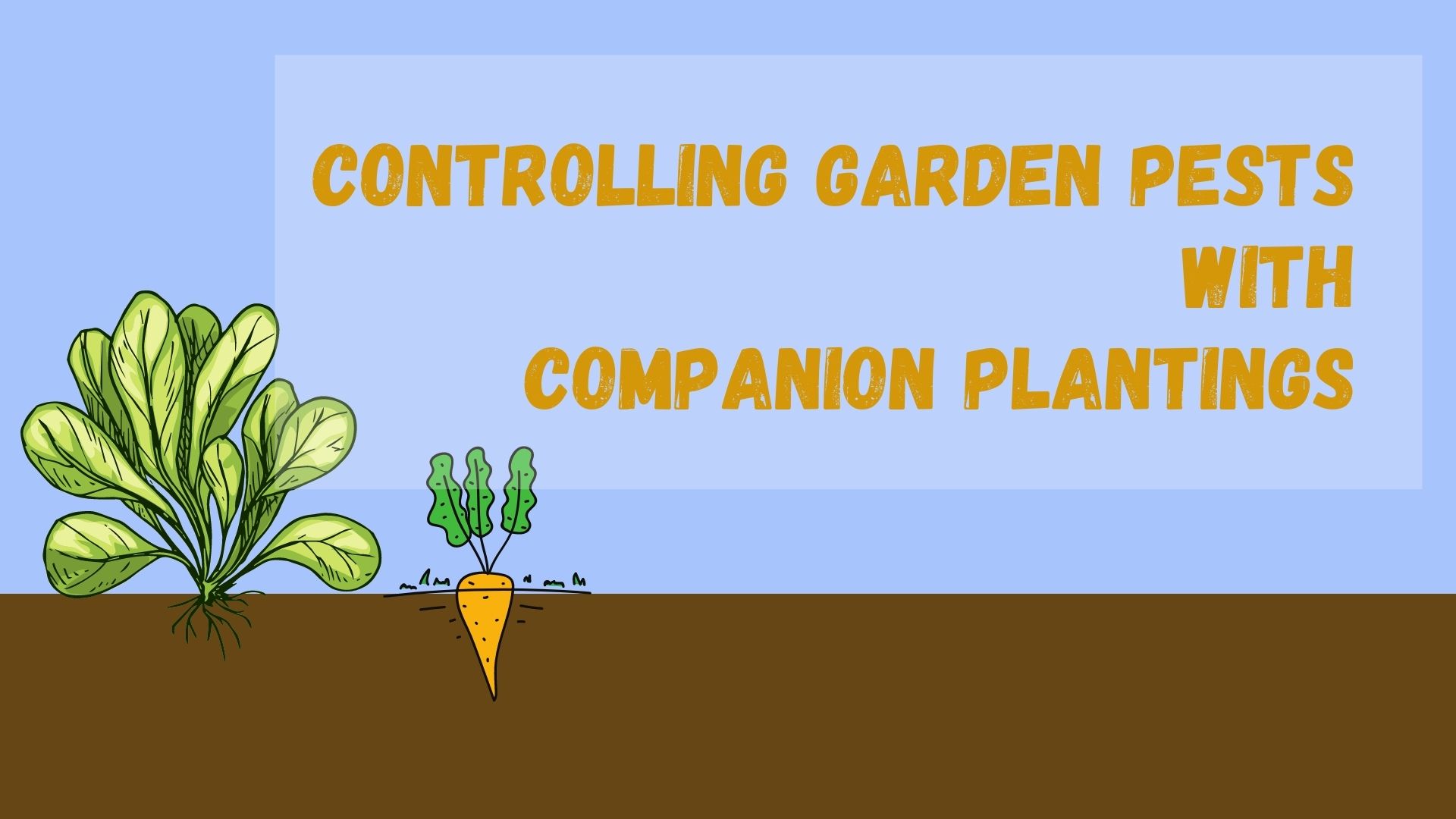Losing patience with insects decimating your garden? Why not try companion planting? Also referred to as inter-planting, inter-cropping, or polyculture, this eco-friendly, non-toxic method of pest management benefits insects such as bees, butterflies, and ladybugs.
Companion planting, or placing two or more different plants near one another, is likely to provide seven benefits:
- Soil preparation and conditioning – using cover crops that fix nitrogen in the soil.
- Weed management – using plants as a crop cover or living mulch to control weeds.
- Pest management – repelling pests and attracting beneficial insects
- disease management – plants are better able to resist disease with less stress from pests
- Enhancing biodiversity
- Improving pollination – attracting pollinators and repelling
- Support – using one plant as a living trellis for another plant to climb
While some companion pairings have been scientifically proven through research, many stem from anecdotal garden wisdom.
Planting basil near tomatoes helps repel flies, and mosquitoes, and improves tomato yields. For peppers, basil improves their flavor, and helps repel aphids, spider mites, mosquitoes, and flies. French marigolds help prevent nematodes.
Corn and beans grow well together because beans climb the cornstalks, a natural trellis. Beans also fix nitrogen in the soil, which is good for the corn.
Consult the chart below for other beneficial companion plant pairings to help your garden naturally control pests.
| PLANT | INSECTS AND PESTS DETERRED | PLANT NEAR |
| Asters
|
Most insects | Sunflower, plant around the garden |
| Basil
|
Flies, thrips, and mosquitoes | Tomato, peppers, avoid planting near rue |
| Borage
|
Tomato worn, cabbage worms | Tomato, cabbage family crops, strawberry |
| Calendula
|
Asparagus beetles, tomato hornworms, most insects | All vegetables and herbs |
| Catnip
|
Flea beetles, spittlebugs, ants, Japanese beetles, weevils | All vegetables |
| Celery
|
White cabbage butterfly | Leek, tomato, cabbage, cauliflower, bush bean |
| Chrysanthemum
|
Most insects, nematodes, spider mites | Tomato; avoid planting near lettuce |
| Dead Nettle
|
Potato bugs | Potato |
| Eggplant
|
Colorado potato beetle | Green bean, lettuce |
| Flax
(Linnum usitatissimum) |
Potato bugs | Potato, carrot |
| Garlic
|
Japanese beetle, aphids, spider mites, other insects, and blight | Tomato, eggplant, cabbage family plants; avoid planting near peas, beans, and other legumes |
| Geranium
|
Cabbageworms, corn earworms, Japanese beetles, most insects | Interplant with vegetables, especially cabbage |
| Horseradish
|
Potato bug | Potato, horseradish needs a permanent home |
| Henbit
|
Most insects | |
| Hyssop
|
Cabbage moth | Cabbage family, orchards, grapevines; avoid planting near radishes |
| Marigold
|
Nearly all insects including Mexican bean beetles and nematodes | Potato, tomato, pepper, eggplant, roses |
| Mint
|
Cabbage moth and ants | Cabbage, tomato |
| Mole plant (Euphorbia lathyrus)
|
Moles, gophers, mice | Space around the garden every 5 feet as a barrier |
| Nasturtium
|
Aphids, squash bugs, striped pumpkin beetles, whiteflies | Beans, summer squash, zucchini, cabbage family plants, cucumber |
| Onion family
|
Most pests, Colorado potato beetles, carrot rust flies, spider mites | Most vegetables except peas, beans, sage |
| Petunia
|
Bean pests, Mexican bean beetles, potato bugs, squash bugs | Beans, squash, potato |
| Pot Marigold
|
Asparagus beetles, tomato worms, general garden pests | Asparagus, tomato, most vegetables |
| Peppermint
|
White cabbage butterfly | Cabbage |
| Radish
|
Cucumber beetles, squash borers | Beans, carrot, cucumber, kohlrabi, parsnip, onion, squash |
| Rosemary
|
Cabbage moth, bean beetle, carrot fly | Beans, cabbage family plants, carrot |
| Rue
|
Japanese beetle | Avoid skin contact; do not plant near cabbage family plants |
| Sage
|
Cabbage moth, carrot fly | Plant with perennial vegetables; avoid planting with cucumbers and rue |
| Salsify
|
Carrot fly | Carrot family plants |
| Southernwood (Artemisia abrotanum)
|
Cabbage moth, black aphids | Cabbage family plants or make a southernwood-water solution to spray cabbage |
| Summer Savory
|
Bean beetles | Beans, onion |
| Tansy
|
Flying insects, Japanese beetles, striped cucumber beetles, squash bugs, ants | Squash, potato; avoid planting near collard |
| Thyme
|
Cabbage worm | Eggplant, cabbage, potato, tomato, almost all vegetables, and herbs |
| Tomato
|
Asparagus beetle | Asparagus, dill, borage |
| Wormwood (Artemisia absinthium)
|
Carrot fly, white cabbage butterfly, black flea beetle | Do not plant wormwood in the vegetable garden, but leaves used to make a spray will deter insects. |

